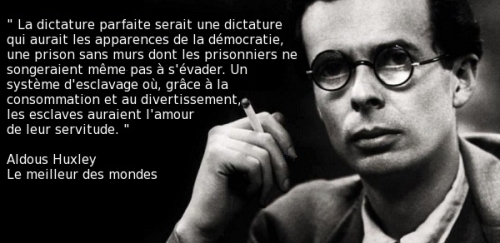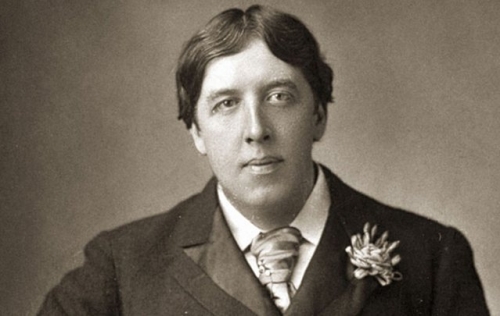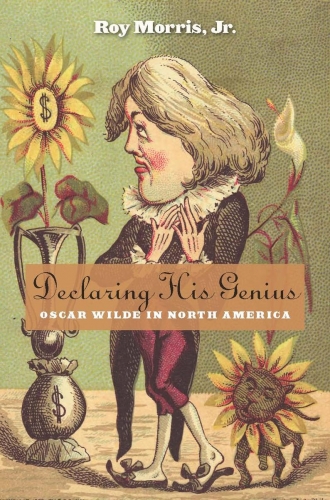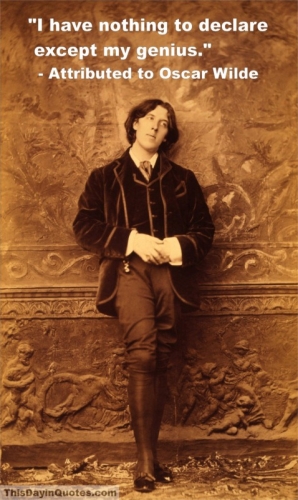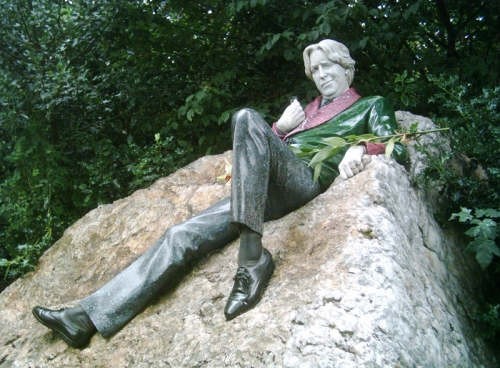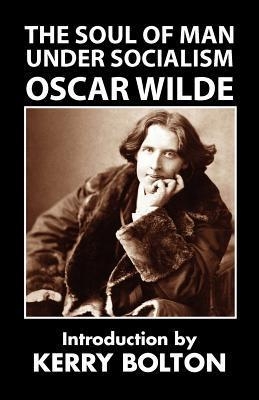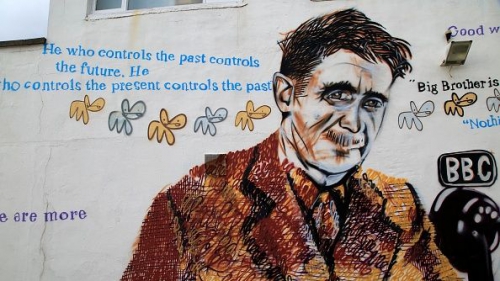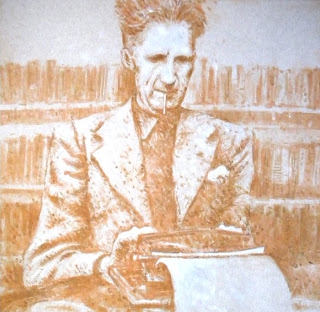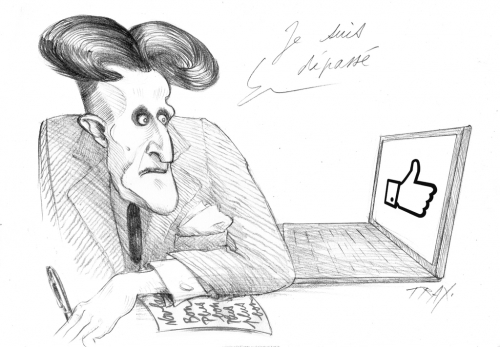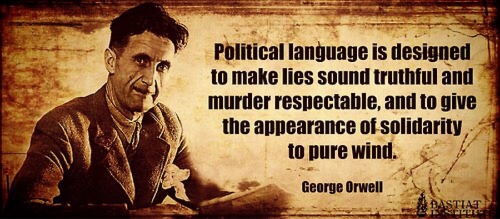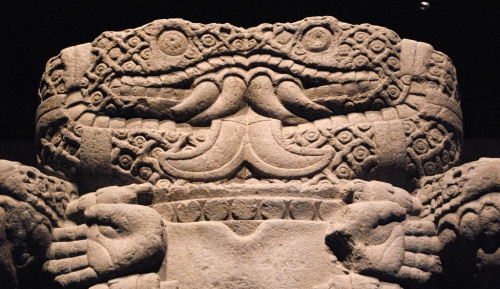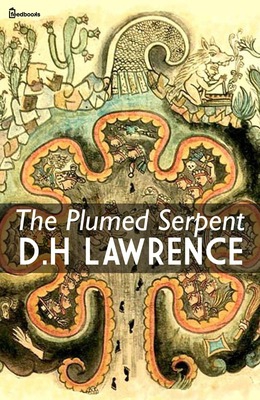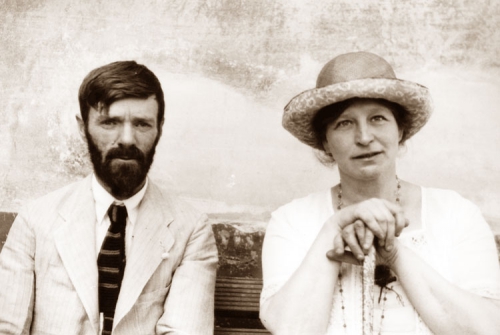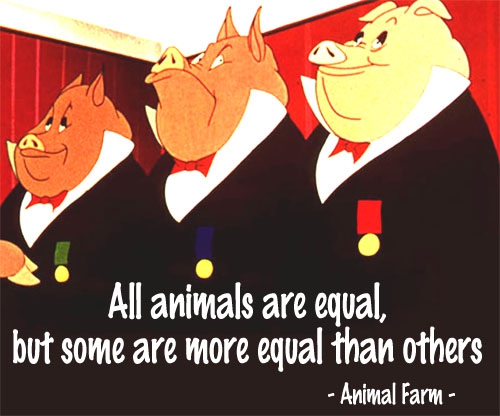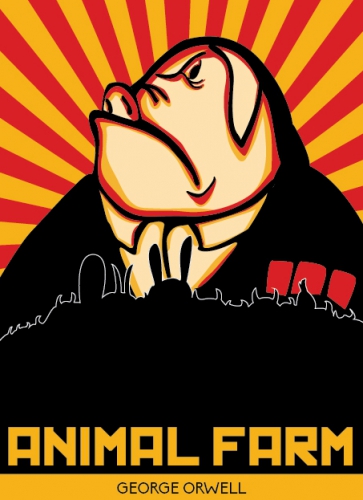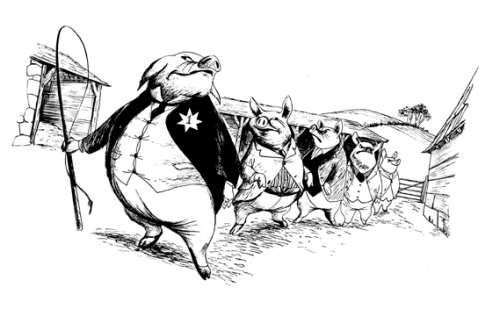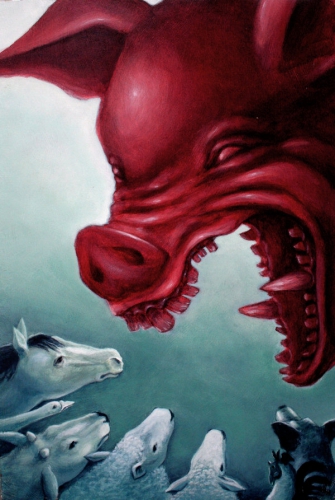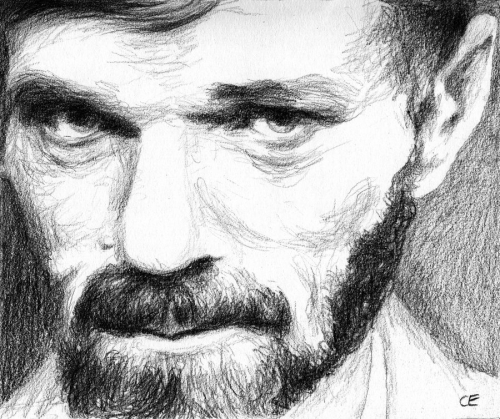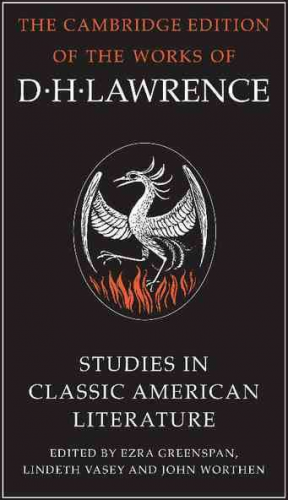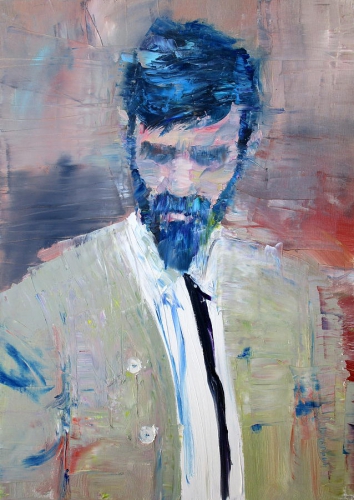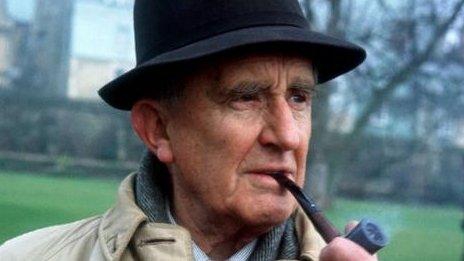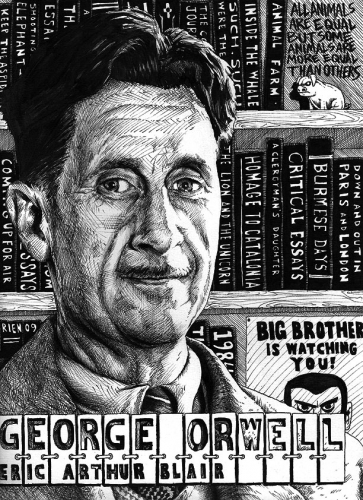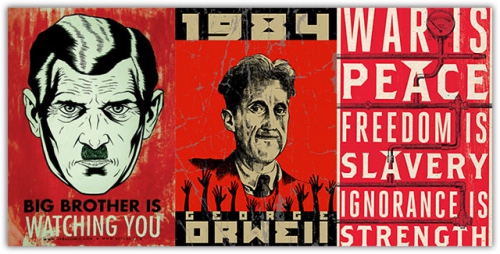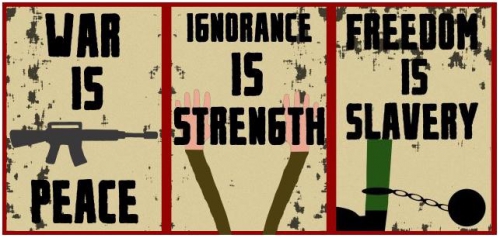Nota : ce texte est long et dûment référencé. Il apparaîtra pessimiste à certains.
On est en 1957. Sputnik fait rêver les plus conditionnés, mais Aldous Huxley rappelle :
« En 1931, alors que j'écrivais Le Meilleur des Mondes, j'étais convaincu que le temps ne pressait pas encore. La société intégralement organisée, le système scientifique des castes, l'abolition du libre arbitre par conditionnement méthodique, la servitude rendue tolérable par des doses régulières de bonheur chimiquement provoqué, les dogmes orthodoxes enfoncés dans les cervelles pendant le -sommeil au moyen des cours de nuit, tout cela approchait; se réaliserait bien sûr, mais ni de mon vivant, ni même du vivant de mes petits-enfants. »
Il fait un constat après la guerre, comme Bertrand de Jouvenel :
« Vingt-sept ans plus tard, dans ce troisième quart du vingtième siècle après J-C. et bien longtemps avant la fin du premier siècle après F., je suis beaucoup moins optimiste que je l'étais en écrivant Le Meilleur des Mondes. Les prophéties faites en 1931 se réalisent bien plus tôt que je le pensais. L'intervalle béni entre trop de désordre et trop d'ordre n'a pas commencé et rien n'indique qu'il le fera jamais. En Occident, il est vrai, hommes et femmes jouissent encore dans une appréciable mesure de la liberté individuelle, mais même dans les pays qui ont une longue tradition de gouvernement démocratique cette liberté, voire le désir de la posséder, paraissent en déclin. Dans le reste du monde, elle a déjà disparu, ou elle est sur le point de le faire. Le cauchemar de l'organisation intégrale que j'avais situé dans le septième siècle après F. a surgi de lointains dont l'éloignement rassurait et nous guette maintenant au premier tournant. »
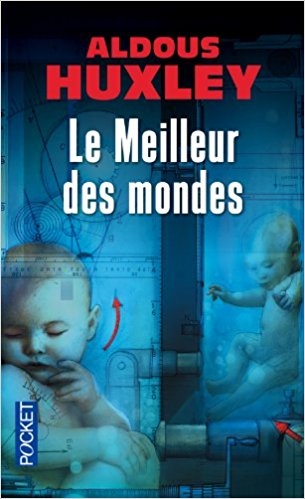 Le communisme a facilement chuté partout finalement mais il a été remplacé parce que Debord nomme le spectaculaire intégré. Tocqueville déjà disait « qu’en démocratie on laisse le corps pour s’attaquer à l’âme. »
Le communisme a facilement chuté partout finalement mais il a été remplacé parce que Debord nomme le spectaculaire intégré. Tocqueville déjà disait « qu’en démocratie on laisse le corps pour s’attaquer à l’âme. »
Le futur c’est la carotte plutôt que le bâton (cf. mes textes sur Tocqueville, Nietzsche ou le film Network) :
« A la lumière de ce que nous avons récemment appris sur le comportement animal en général et sur le comportement humain en particulier, il est devenu évident que le contrôle par répression des attitudes non conformes est moins efficace, au bout du compte, que le contrôle par renforcement des attitudes satisfaisantes au moyen de récompenses et que, dans l'ensemble, la terreur en tant que procédé de gouvernement rend moins bien que la manipulation non violente du milieu, des pensées et des sentiments de l'individu. »
La manipulation est donc à l’ordre du jour :
« Pendant ce temps, des forces impersonnelles sur lesquelles nous n'avons presque aucun contrôle semblent nous pousser tous dans la direction du cauchemar de mon anticipation et cette impulsion déshumanisée est sciemment accélérée par les représentants d'organisations commerciales et politiques qui ont mis au point nombre de nouvelles techniques pour manipuler, dans l'intérêt de quelque minorité, les pensées et les sentiments des masses. »
La clé du système est son renforcement par la démographie explosive :
« De plus, l'accroissement annuel lui-même s'accroît : régulièrement, selon la règle des intérêts composés et irrégulièrement aussi, à chaque application, par une société technologiquement retardataire, des principes de la Santé publique. A l'heure présente, cet excédent atteint 43 millions environ pour l'ensemble du globe, ce qui signifie que tous les quatre ans l'humanité ajoute à ses effectifs l'équivalent de la population actuelle des Etats-Unis - tous les huit ans et demi l'équivalent de la population actuelle des Indes. »
Huxley remet à sa place les blablas sur la pseudo-conquête spatiale :
« Une nouvelle ère est censée avoir commencé le 4 octobre 1957, mais en réalité, dans l'état présent du monde, tout notre exubérant bavardage post-spoutnik est hors de propos, voire même absurde. En ce qui concerne les masses de l'humanité, l'âge qui vient ne sera pas celui de l'Espace cosmique, mais celui de la surpopulation. »
Conséquence ? Les « trous à merde » de Donald :
« Les faits contrôlables semblent indiquer assez nettement que dans la plupart des pays sous-développés, le sort de l'individu s'est détérioré de façon appréciable au cours du dernier demi-siècle. Les habitants sont plus mal nourris; il existe moins de biens de consommation disponibles par tête et pratiquement tous les efforts faits pour améliorer la situation ont été annulés par l'impitoyable pression d'un accroissement continu de la population. »
Le « plus froid des monstres froids » (Nietzsche) va se développer. Une remarque digne de Jouvenel :
« Ainsi, des pouvoirs de plus en plus grands sont concentrés entre les mains de l'exécutif et de ses bureaucrates. Or, la nature du pouvoir est telle que même ceux qui ne l'ont pas recherché mais à qui il a été imposé, ont tendance à y prendre goût… »
Le Deep State (le « minotaure » de Jouvenel) est condamné à croître avec le totalitarisme dans les pays en voie de surpeuplement :
« Insécurité et agitation mènent à un contrôle accru exercé par les gouvernements centraux et à une extension de leurs pouvoirs. En l'absence d'une tradition constitutionnelle, ces pouvoirs accrus seront probablement exercés de manière dictatoriale. »
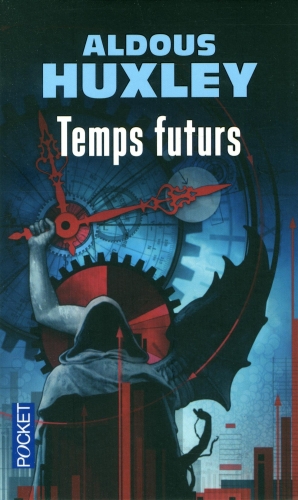 La surpopulation américaine menacera la démocratie américaine (triplement en un siècle ! La France a crû de 40% en cinquante ans) :
La surpopulation américaine menacera la démocratie américaine (triplement en un siècle ! La France a crû de 40% en cinquante ans) :
« Pour le moment, la surpopulation ne constitue pas pour la liberté individuelle des Américains un danger direct, mais déjà la menace d'une menace. »
Eugéniste, proche de Carrel ici, Huxley annonce un déclin qualitatif de notre population et de notre intelligence, fait aujourd’hui reconnu :
« Malgré les nouvelles drogues-miracle et des traitements plus efficaces (on peut même dire en un certain sens, grâce à eux), la santé physique de la masse ne s'améliorera pas, au contraire, et un déclin de l'intelligence moyenne pourrait bien accompagner cette détérioration. »
Huxley critique froidement les progrès de la médecine (ou leur mauvaise gestion) :
« La mort rapide due à la malaria a été supprimée, mais une existence rendue misérable par la sous-alimentation et le surpeuplement est main- tenant la règle et une mort lente, par inanition, guette un nombre de plus en plus grand d'habitants. »
Huxley ici reprend Bernays sur la montée des élites :
« Nous voyons donc que la technique moderne a conduit à la concentration du pouvoir économique et politique ainsi qu'au développement d'une société contrôlée (avec férocité dans les Etats totalitaires, courtoisie et discrétion dans les démocraties) par les Grosses Affaires et les Gros Gouvernements. »
Notre auteur cite Fromm :
« …Notre société tend à faire de lui un automate qui paie son échec sur le plan humain par des maladies mentales toujours plus fréquentes et un désespoir qui se dissimule sous une frénésie de travail et de prétendu plaisir. »
Puis Huxley évalue la nullité des hommes modernes et par là se rapproche de René Guénon (voyez l’anonymat dans le règne de la quantité) :
« Ces millions d'anormalement normaux vivent sans histoires dans une société dont ils ne s'accommoderaient pas s'ils étaient pleinement humains et s'accrochent encore à « l'illusion de l'individualité », mais en fait, ils ont été dans une large mesure dépersonnalisés. Leur conformité évolue vers l'uniformité. »
Le futur est à la termitière :
« La civilisation este entre autres choses, le processus par lequel les bandes primitives sont transformées en un équivalent, grossier et mécanique, des communautés organiques d'insectes sociaux. A l'heure présente, les pressions du surpeuplement et de l'évolution technique accélèrent ce mouvement. La termitière en est arrivée à représenter un idéal réalisable et même, aux yeux de certains, souhaitable. »
Termitière ? Plus effrayant encore ce passage – car tous les mots sont rentrés dans notre lexique :
« Ainsi que l'a montré Mr. William Whyte dans son remarquable ouvrage, The Organization man, une nouvelle Morale Sociale est en train de remplacer notre système traditionnel qui donne la première place à l'individu. Les mots clefs en sont : « ajustement », « adaptation », « comportement social ou antisocial », « intégration », « acquisition de techniques sociales », « travail d'équipe », « vie communautaire », « loyalisme communautaire », « dynamique communautaire », « pensée communautaire », « activités créatrices communautaires »…
Car l’ingénierie sociale c’est la fin du christianisme et même du Christ :
« Selon la Morale Sociale, Jésus avait complètement tort quand il affirmait que le sabbat a été fait pour l'homme pour l'homme; au contraire, c'est l'homme qui. a été fait pour le sabbat, qui doit sacrifier ses particularités natives et faire semblant d'être la sorte de bon garçon invariablement liant que les organisateurs d'activités collectives considèrent comme le plus propre à leurs fins. »
En bon patricien britannique (voyez mon livre sur Tolkien, mes essais sur Chesterton), Huxley refuse cet assemblage :
« Un gouffre immense sépare l'insecte social du mammifère avec son gros cerveau, son instinct grégaire très mitigé et ce gouffre demeurerait, même si l'éléphant s'efforçait d'imiter la fourmi. Malgré tous leurs efforts, les hommes ne peuvent que créer une organisation et non pas un organisme social. En s'acharnant à réaliser ce dernier, ils parviendront tout juste à un despotisme totalitaire. »
Le futur indolore de la domination est programmé :
« Dans les dictatures plus efficaces de demain, il y aura sans doute beaucoup moins de force déployée. Les sujets des tyrans à venir seront enrégimentés sans douleur par un corps d'ingénieurs sociaux hautement qualifiés. »
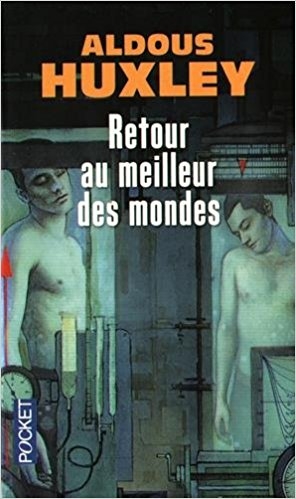 Dix ans avant Umberto Eco (voyez mon livre sur Internet), Huxley annonce un nouveau moyen âge, pas celui de Guénon bien sûr, celui de Le Goff plutôt :
Dix ans avant Umberto Eco (voyez mon livre sur Internet), Huxley annonce un nouveau moyen âge, pas celui de Guénon bien sûr, celui de Le Goff plutôt :
« Les forces impersonnelles du surpeuplement et de l'excès d'organisation jointes aux ingénieurs sociologues qui essaient de les diriger, nous poussent vers un nouveau système médiéval. »
Huxley annonce la propagande à venir en occident :
« La propagande pour une action dictée par des impulsions plus basses que l'intérêt présente des preuves forgées, falsifiées, ou tronquées, évite les arguments logiques et cherche à influencer ses victimes par la simple répétition de slogans, la furieuse dénonciation de boucs émissaires étrangers ou nationaux, et l'association machiavélique des passions les plus viles aux idéaux les plus élevés… »
Huxley méprise la liberté de la presse en rappelant ce simple fait :
« En ce qui concerne la propagande, les premiers partisans de l'instruction obligatoire et d'une presse libre ne l'envisageaient que sous deux aspects : vraie ou fausse. Ils ne prévoyaient pas ce qui, en fait, s'est produit- le développement d'une immense industrie de l'information, ne s'occupant dans l'ensemble ni du vrai, ni du faux, mais de l'irréel et de l'inconséquent à tous les degrés. En un mot, ils n'avaient pas tenu compte de la fringale de distraction éprouvée par les hommes. »
On retombe dans le pain et les jeux de Juvénal :
« Pour trouver une situation comparable, fût-ce de loin, à celle qui existe actuellement, il nous faut remonter jusqu'à la Rome impériale, où la populace était maintenue dans la bonne humeur grâce à des doses fréquentes et gratuites des distractions les plus variées, allant des drames en vers aux combats de gladiateurs, des récitations de Virgile aux séances de pugilat, des concerts aux revues militaires et aux exécutions publiques. Mais même à Rome, il n'existait rien de semblable aux distractions ininterrompues fournies par les journaux, les revues, la radio, la télévision et le cinéma. »
Une prédiction (prédiction ou constatation ?) terrible :
« Une société dont la plupart des membres passent une grande partie de leur temps, non pas dans l'immédiat et l'avenir prévisible, mais quelque part dans les autres mondes inconséquents du sport, des feuilletons, de la mythologie et de la fantaisie métaphysique, aura bien du mal à résister aux empiétements de ceux qui voudraient la manipuler et la dominer. »
Le futur est à la « distraction ininterrompue » qui se mêlera à la propagande.
Huxley cite Albert Speer. Après Hitler on n’a pas arrêté le progrès.
« Depuis l'époque de Hitler, l'arsenal des moyens techniques à la disposition de l'aspirant-dictateur a été considérablement développé! En plus de la radio, du haut-parleur, de la caméra de cinéma et de la presse rotative, le propagandiste contemporain peut faire usage de la télévision pour transmettre non seulement la voix, mais l'image de son client et enregistrer le tout sur des bandes magnétiques. Grâce aux progrès techniques, le Grand Frère peut maintenant être omniprésent presque autant que Dieu. D'ailleurs, il n'y a pas que dans ce domaine que des atouts nouveaux ont été apportés au jeu du dictateur. Depuis Hitler, des travaux considérables ont été faits en psychologie et neurologie appliquées, domaines d'élection du propagandiste, de l'endoctrineur, et du laveur de cerveaux. »
Puis Huxley compare Hitler à Bernays, l’inventeur de la cigarette pour les femmes :
« C'est par la manipulation de « forces cachées » que les experts en publicité vous incitent à acheter leurs produits - une pâte dentifrice, une marque de cigarettes, un candidat politique - et c'est en faisant appel aux mêmes, ainsi qu'à d'autres trop dangereuses pour que s'y frotte Madison Avenue, que Hitler a incité les masses allemandes à s'acheter un Führer, une philosophie insane et une Deuxième Guerre mondiale. »
Après Hitler, la publicité commerciale. Huxley cite Vance Packard et ajoute :
« Nous n'achetons plus des oranges, mais de la vitalité. Nous n'achetons plus une voiture, mais du prestige. » Il en est de même pour tout le reste. Avec un dentifrice, nous achetons non plus un simple détersif antiseptique, mais la libération d'une angoisse : celle d'être sexuellement repoussant. Avec la vodka et le whisky, nous n'achetons pas un poison protoplasmique qui, à doses faibles, peut déprimer le système nerveux de manière utile au point de vue psychologique, nous achetons de l'amabilité, du liant, la chaleur… Avec l'ouvrage à succès du mois, nous acquérons de la culture, l'envie de nos voisins moins intellectuels et le respect des raffinés. »
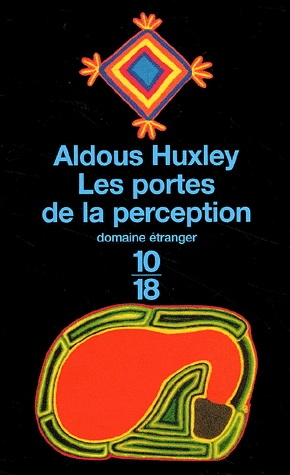 Huxley n’est pas très optimise non plus sur l’avenir des enfants mués en de la chair à télé :
Huxley n’est pas très optimise non plus sur l’avenir des enfants mués en de la chair à télé :
« Comme on pouvait s'y attendre, les jeunes sont extrêmement sensibles à la propagande. Ignorants du monde et de ses usages, ils sont absolument sans méfiance, leur esprit critique n'est pas encore développé, les plus petits n'ont pas atteint l'âge de raison et les plus âgés n'ont pas acquis l'expérience sur laquelle leur faculté de raisonnement nouvellement découverte pourrait s'exercer. En Europe, les conscrits étaient désignés sous le nom badin de « chair à canon ». Leurs petits frères et leurs petites sœurs sont maintenant devenus de la chair à radio et à télévision. Dans mon enfance, on nous apprenait à chanter de petites rengaines sans grand sens ou, dans les familles pieuses, des cantiques. Aujourd'hui, les petits gazouillent de la publicité chantée. »
Pas d’illusions sur les élections et la politique :
« Les partis mettent leurs candidats et leurs programmes sur le marché en utilisant les mêmes méthodes que le monde des affaires pour vendre ses produits… Les services de ventes politiques ne font appel qu'aux faiblesses de leurs électeurs, jamais à leur force latente. Ils se gardent bien d'éduquer les masses et de les mettre en mesure de se gouverner elles-mêmes, jugeant très suffisant de les manipuler et de les exploiter. »
Sur le lavage de cerveau pratiqué dans notre planète-prison, Huxley rappelle :
« Si le système nerveux central du chien peut être brisé, celui d'un prisonnier politique aussi. Il s'agit seulement d'appliquer les doses de tension voulues pendant le temps voulu. A la fin du traitement, l'interné sera dans un état de névrose ou d'hystérie tel qu'il avouera ce que ses geôliers voudront. »
Huxley explique pourquoi notre système de suggestibilité encourage le somnambulisme puis il rappelle tristement :
« L'efficacité de la propagande politique et religieuse dépend des méthodes employées et non pas des doctrines enseignées. Ces dernières peuvent être vraies ou fausses, saines ou pernicieuses, peu importe. Si l'endoctrinement est bien fait au stade voulu de l'épuisement nerveux, il réussira. »
Opiomanie ou toxicomanie ? Huxley rappelle ici le fameux soma de son roman :
« La ration de soma quotidienne était une garantie contre l'inquiétude personnelle, l'agitation sociale et la propagation d'idées subversives. Karl Marx déclarait que la religion était l'opium du peuple, mais dans le Meilleur des Mondes la situation se trouvait renversée : l'opium, ou plutôt le soma, était la religion du peuple. »
Huxley rappelle nos progrès en chimie du cerveau et il prophétise l’addiction américaine responsable aujourd’hui de dizaines de milliers de morts :
« …prenez le cas des barbituriques et des tranquillisants. Aux U.S.A., ces remèdes peuvent être obtenus avec une simple ordonnance de docteur, mais l'avidité du public américain pour quelque chose qui rendra un peu plus supportable la vie dans le milieu urbain et industriel est si grande, que les médecins ordonnent actuellement de ces spécialités au rythme de 48 millions de prescriptions par an. »
On contrôlera donc l’opposition politique par les tranquillisants !
« Les masses ne risqueront pas de créer la moindre difficulté à leur maître. Seulement, dans l'état actuel des choses, les tranquillisants peuvent empêcher certaines personnes de créer assez de difficulté, non seulement à leurs dirigeants, mais à elles-mêmes. »
On peut même gagner la guerre par les tranquillisants !
« Lors d'une récente conférence sur le méprobamate, à laquelle je participais, un éminent biochimiste proposa en riant que le gouvernement des U.S.A. envoyât gratuitement au peuple soviétique 50 milliards de doses du plus populaire des tranquillisants. La plaisanterie avait son côté inquiétant. »
Chez Huxley comme chez La Boétie le fond du problème n’est pas la malignité de la science ou des élites sinon la médiocrité de la nature humaine démontrée ici par la science...
« Les idéaux de la démocratie et de la liberté se heurtent au fait brutal de la suggestibilité humaine. Un cinquième de tous les électeurs peut être hypnotisé presque en un clin d'œil, un septième soulagé de ses souffrances par des piqûres d'eau, un quart suggestionné avec rapidité et dans l'enthousiasme par I'hypnopédie. A toutes ces minorités trop promptes à coopérer, on doit ajouter les majorités aux réactions moins rapides dont la suggestibilité plus modérée peut être exploitée par n'importe quel manipulateur connaissant son affaire, prêt à y consacrer le temps et les efforts nécessaires. »
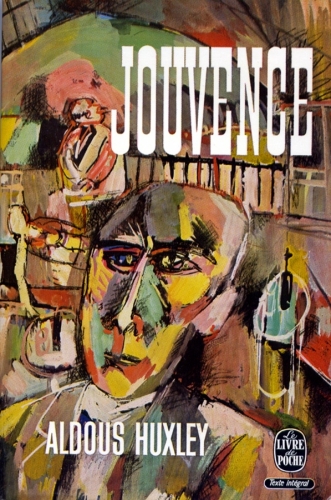 Quant au futur, no comment :
Quant au futur, no comment :
« La liberté individuelle est-elle compatible avec un degré élevé de suggestibilité? Les institutions démocratiques peuvent-elles survivre à la subversion exercée du dedans par des spécialistes habiles dans la science et l'art d'exploiter la suggestibilité à la fois des individus et des foules? »
Il reste que le futur, en 1957, c’est aussi, c’est surtout cent millions de couillonnes sur Instagram admirant et imitant Kylie Jenner. Huxley :
« Et l'uniformisation des êtres était encore parachevée après la naissance par le conditionnement infantile, l'hypnopédie et l'euphorie chimique destinée à remplacer la satisfaction de se sentir libre et créateur. Dans le monde où nous vivons, ainsi qu'il a été indiqué dans des chapitres précédents, d'immenses forces impersonnelles tendent vers l'établissement d'un pouvoir centralisé et d'une société enrégimentée. La standardisation génétique est encore impossible, mais les Gros Gouvernements et les Grosses Affaires possèdent déjà, ou posséderont bientôt, tous les procédés pour la manipulation des esprits décrits dans Le Meilleur des Mondes, avec bien d'autres que mon manque d'imagination m'a empêché d'inventer. »
Le monde une prison, conclue Hamlet avec Rosencrantz et Guildenstern.
Huxley poursuit cruellement par les banalités d’usage sur l’éducation qui nous rendrait résistant :
« Si nous voulons éviter ce genre de tyrannie, il faut que nous commencions sans délai notre éducation et celle de nos enfants pour nous rendre aptes à être libres et à nous gouverner nous-mêmes. »
Cette éducation (cf. la chasse aux fake news) peut aisément être recyclée en ce que l’on sait !
Il rappelle ce truisme :
« Les effets d'une propagande mensongère et pernicieuse ne peuvent être neutralisés que par une solide préparation à l'art d'analyser ses méthodes et de percer à jour ses sophismes. »
Huxley rappelle à temps que personne ne veut de contre-propagande !
« Et pourtant, nulle part on n'enseigne aux enfants une méthode systématique pour faire le départ entre le vrai et le faux, une affirmation sensée et une autre qui ne l'est pas. Pourquoi? Parce que leurs aînés, même dans les pays démocratiques, ne veulent pas qu'ils reçoivent ce genre d'instruction. Dans ce contexte, la brève et triste histoire de l'Institute for Propaganda Analysis est terriblement révélatrice. Il avait été fondé en 1937, alors que la propagande nazie faisait le plus de bruit et de ravages, par Mr. Filene, philanthrope de la Nouvelle-Angleterre. Sous ses auspices, on pratiqua la dissection des méthodes de propagande non rationnelle et l'on prépara plusieurs textes pour l'instruction des lycéens et des étudiants. Puis vint la guerre, une guerre totale, sur tous les fronts, celui des idées au moins autant que celui des corps. Alors que tous les gouvernements alliés se lançaient dans “la guerre psychologique”, cette insistance sur la nécessité de disséquer la propagande sembla quelque peu dépourvue de tact. L'Institut fut fermé en 1941. »
Huxley rappelle les raisons de cette timidité :
« L'examen trop critique par trop de citoyens moyens de ce que disent leurs pasteurs et maîtres pourrait s'avérer profondément subversif. Dans sa forme actuelle, l'ordre social dépend, pour continuer d'exister, de l'acceptation, sans trop de questions embarrassantes, de la propagande mise en circulation par les autorités et de celle qui est consacrée par les traditions locales. »
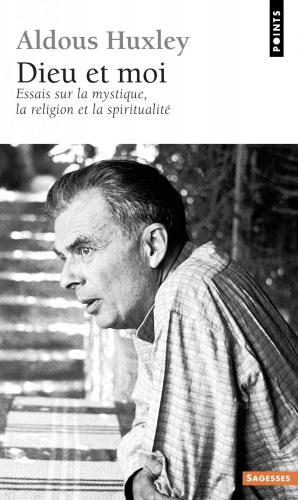 Dans son maigre énoncé des solutions (il n’en a pas), Huxley évoque alors la prison sans barreau (the painless concentration camp, expression mise en doute par certains pro-systèmes !) :
Dans son maigre énoncé des solutions (il n’en a pas), Huxley évoque alors la prison sans barreau (the painless concentration camp, expression mise en doute par certains pro-systèmes !) :
« Il est parfaitement possible qu'un homme soit hors de prison sans être libre, à l'abri de toute contrainte matérielle et pourtant captif psychologiquement, obligé de penser, de sentir et d'agir comme le veulent les représentants de l'Etat ou de quelque intérêt privé à l'intérieur de la nation. »
Huxley recommande de protéger les lieux publics et la télévision. Or on ne peut protéger les lieux publics et la télévision qui ne sont là que pour vendre et pour puer : il faut donc les éviter. Si ton œil t’est objet de tentation…
Il note justement que « les formes libérales serviront simplement à masquer et à enjoliver un fond situé aux antipodes du libéralisme », et que le futur n’est guère plus joyeux que le présent de Bernays : « Entre-temps, l'oligarchie au pouvoir et son élite hautement qualifiée de soldats, de policiers, de fabricants de pensée, de manipulateurs mentaux mènera tout et tout le monde comme bon lui semblera. »
Sur notre futur monopolistique, Huxley ne se fait guère d’illusions (qui s’en fait encore ?) :
« Mais c'est un fait historique aujourd'hui que les moyens de production sont rapidement centralisés et monopolisés par les Grosses Affaires et les Gros Gouvernements. Par conséquent, si vous avez foi en la démocratie, prenez des mesures pour distribuer les biens aussi largement que possible. »
Huxley, beaucoup moins méchant que ce que pensent pas mal d’antisystèmes, propose une solution de révolution médiévale digne de Chesterton et Belloc :
« Par conséquent, si vous souhaitez éviter l'appauvrissement spirituel des individus et de sociétés entières, quittez les grands centres et faites revivre les petites agglomérations rurales, ou encore humanisez la ville en créant à l'intérieur du réseau de son organisation mécanique, les équivalents urbains des petits centres ruraux où les individus peuvent se rencontrer et coopérer en qualité de personnalités complètes, et non pas comme de simples incarnations de fonctions spécialisées. »
Mais rien n’y fait (on est à l’époque du génial Mumford) :
« Nous savons que, pour la plupart de nos semblables, la vie dans une gigantesque ville moderne est anonyme, atomique, au-dessous du niveau humain, néanmoins les villes deviennent de plus en plus démesurées et le mode de vie urbano-industriel demeure inchangé. »
Huxley, qui finit par citer Dostoïevski et son grand inquisiteur, ne se fait guère d’illusions, sondages à l’appui :
« Aux U.S.A. - et l'Amérique est l'image prophétique de ce que sera le reste du monde urbano-industriel dans quelques années d'ici - des sondages récents de l'opinion publique ont révélé que la majorité des adolescents au-dessous de vingt ans, les votants de demain, ne croient pas aux institutions démocratiques, ne voient pas d'inconvénient à la censure des idées impopulaires, ne jugent pas possible le gouvernement du peuple par le peuple et s'estimeraient parfaitement satisfaits d'être gouvernés d'en haut par une oligarchie d'experts assortis, s'ils pouvaient continuer à vivre dans les conditions auxquelles une période de grande prospérité les a habitués. »
Les jeunes sont soumis, les ados sont pires que les autres, comme je l’ai constaté dans ma jeunesse et comme le montrera le succès mondial de culture sexe, drogue, rock. Huxley :
« Que tant de jeunes spectateurs bien nourris de la télévision, dans la plus puissante démocratie du monde, soient si totalement indifférents à l'idée de se gouverner eux-mêmes, s'intéressent si peu à la liberté d'esprit et au droit d'opposition est navrant, mais assez peu surprenant. »
Il évoque les oiseaux (La Boétie évoquait les chiens) …
« Tout oiseau qui a appris à gratter une bonne pitance d'insectes et de vers sans être obligé de se servir de ses ailes renonce bien vite au privilège du vol et reste définitivement à terre. »
La suite est lyrique !
« Le cri de « Donnez-moi la télévision et des saucisses chaudes, mais ne m'assommez pas avec les responsabilités de l'indépendance », fera peut-être place, dans des circonstances différentes à celui de « La liberté ou la mort ».
Et le maître de conclure :
« Il semble qu'il n'y ait aucune raison valable pour qu'une dictature parfaitement scientifique soit jamais renversée. »
Demandez à Zuckerberg, à la NSA et à Monsanto ce qu’ils en pensent.
Sources complémentaires
Huxley – Le meilleur des mondes ; retour au meilleur des mondes (1957), sur archive.org
Nicolas Bonnal – Comment les peuples sont devenus jetables ; comment les Français sont morts ; la culture comme arme de destruction massive (Amazon.fr)
Umberto Eco – Vers un nouveau moyen âge (1972)
Bertrand de Jouvenel – Du Pouvoir (Pluriel)
Vince Packard – Hidden persuaders
Armand Mattelart – Histoire de l’utopie planétaire (la Découverte)
Chesterton – What I saw in America (Gutenberg.org)
Shakespeare – Mesure pour mesure ; Hamlet ; La tempête (inlibroveritas.net)
La Boétie – Sur la servitude volontaire (Wikisource)
Tocqueville – De la démocratie en Amérique (classiques.Uqac.ca)
Debord – Commentaires



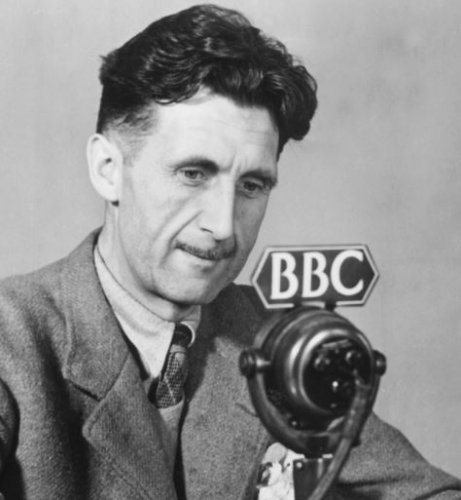

 del.icio.us
del.icio.us
 Digg
Digg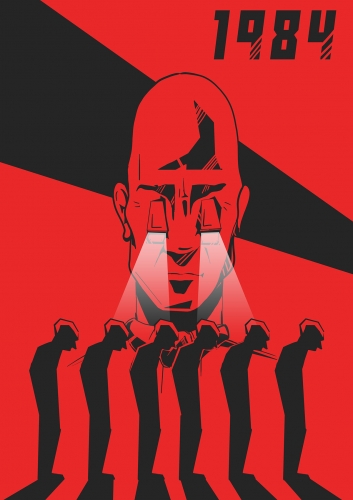
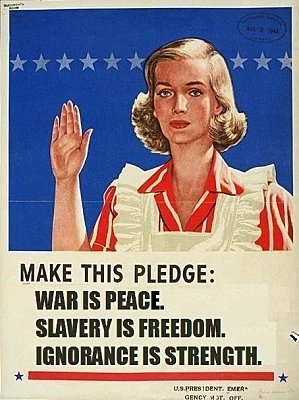 La Novlangue
La Novlangue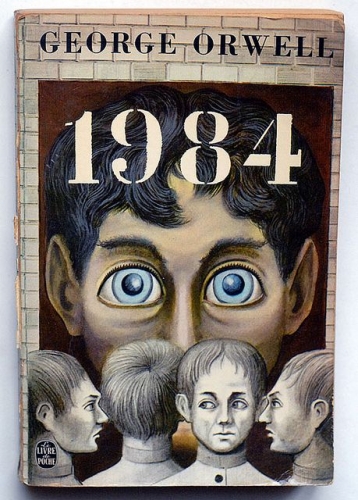

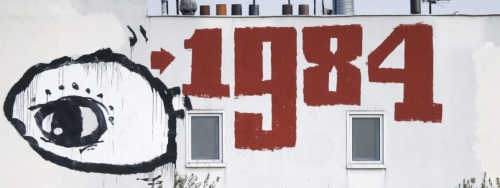
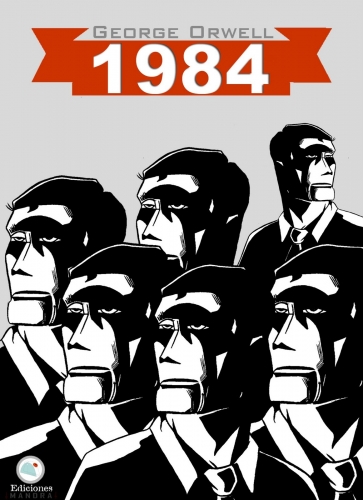 Conclusion
Conclusion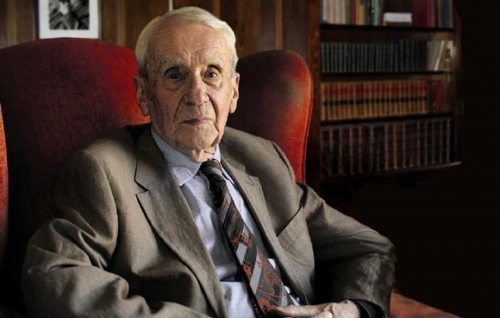
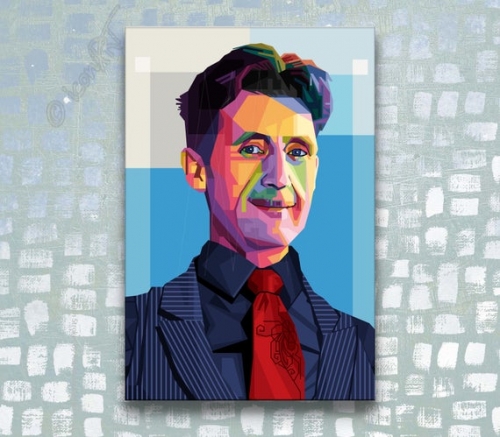
 To his credit, Ryan does not spend much ink on critical analyses of the various presentations. That would make for a very fat and dreary book. In nearly every instance he’d have to tell us that the production was uneven and woefully miscast. I wondered if he was going to carp about the misconceived film adaptation of Keep the Aspidistra Flying (1997; American title: A Merry War). Not a bit of it; he leaves it to us to do the carping and ridicule. What he does provide is a rich concordance of Orwell presentations over the years, with often amazing production notes, technical details, and contemporary press notices. And if you don’t care to get that far into weeds, George Orwell on Screen is still an indispensable guidebook, pointing you to all sorts of bio-documentaries and dramatizations you might never discover on your own. This is particularly true of the many (mostly) BBC docos produced forty or fifty years ago, where you find such delights as Malcolm Muggeridge and Cyril Connolly lying down in tall grass and trading tales about their late, great friend.
To his credit, Ryan does not spend much ink on critical analyses of the various presentations. That would make for a very fat and dreary book. In nearly every instance he’d have to tell us that the production was uneven and woefully miscast. I wondered if he was going to carp about the misconceived film adaptation of Keep the Aspidistra Flying (1997; American title: A Merry War). Not a bit of it; he leaves it to us to do the carping and ridicule. What he does provide is a rich concordance of Orwell presentations over the years, with often amazing production notes, technical details, and contemporary press notices. And if you don’t care to get that far into weeds, George Orwell on Screen is still an indispensable guidebook, pointing you to all sorts of bio-documentaries and dramatizations you might never discover on your own. This is particularly true of the many (mostly) BBC docos produced forty or fifty years ago, where you find such delights as Malcolm Muggeridge and Cyril Connolly lying down in tall grass and trading tales about their late, great friend.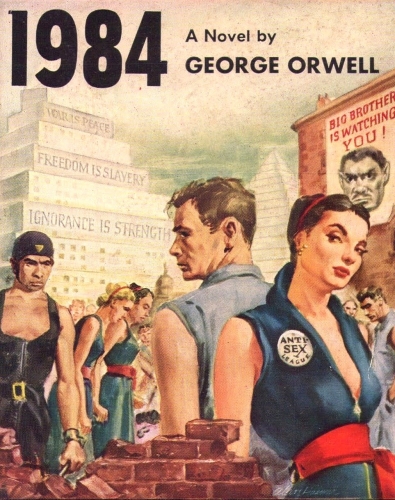
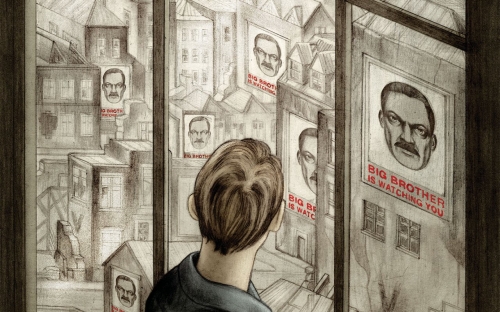
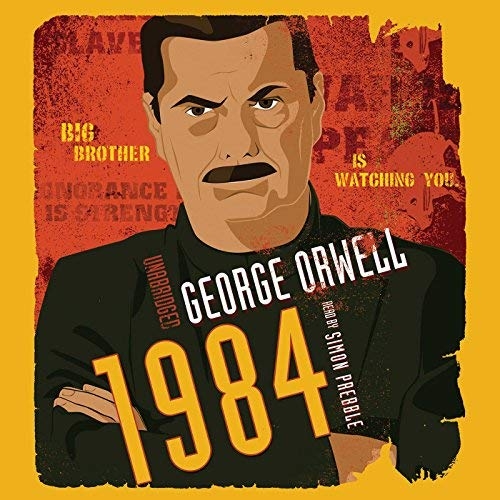
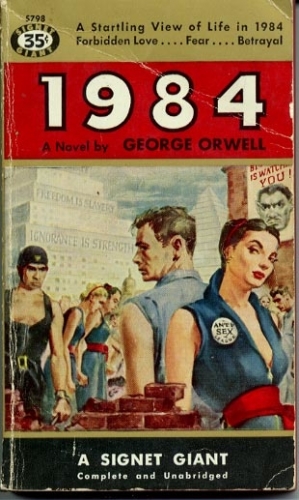 d crib-note interpretation of O’Brien (“zealous Party leader . . . brutally ugly”), but pray consider: a) Connolly was Orwell’s only acquaintance of note who came close to the novel’s description of O’Brien, physically and socially; b) if you bother to read O’Brien’s monologues in the torture clinic, you see he’s doing a kind of Doc Rockwell routine: lots of fast-talking nonsense about power and punishment, signifying nothing.
d crib-note interpretation of O’Brien (“zealous Party leader . . . brutally ugly”), but pray consider: a) Connolly was Orwell’s only acquaintance of note who came close to the novel’s description of O’Brien, physically and socially; b) if you bother to read O’Brien’s monologues in the torture clinic, you see he’s doing a kind of Doc Rockwell routine: lots of fast-talking nonsense about power and punishment, signifying nothing.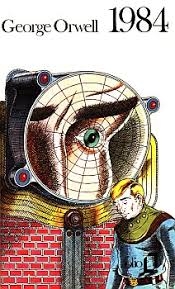 A good deal of Nineteen Eighty-Four, in fact, is a twisted retelling of Keep the Aspidistra Flying.
A good deal of Nineteen Eighty-Four, in fact, is a twisted retelling of Keep the Aspidistra Flying.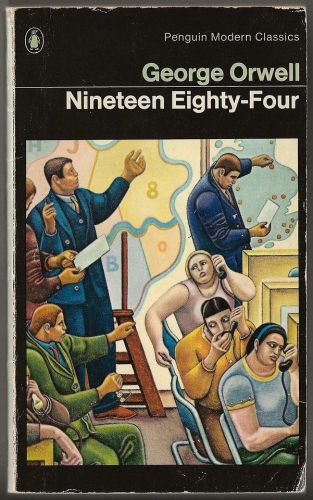 To repeat the obvious, Burnham was describing Communism, not some theoretical “totalitarianism,” as in some press blurbs for Nineteen Eighty-Four. As noted, Orwell explicitly disavowed any connection between his fictional “Party” and the Communist one. Nevertheless, the political program that O’Brien boasts about to Winston Smith is the Communist program à la James Burnham. It’s exaggerated and comically histrionic, but strikes the proper febrile tone.
To repeat the obvious, Burnham was describing Communism, not some theoretical “totalitarianism,” as in some press blurbs for Nineteen Eighty-Four. As noted, Orwell explicitly disavowed any connection between his fictional “Party” and the Communist one. Nevertheless, the political program that O’Brien boasts about to Winston Smith is the Communist program à la James Burnham. It’s exaggerated and comically histrionic, but strikes the proper febrile tone.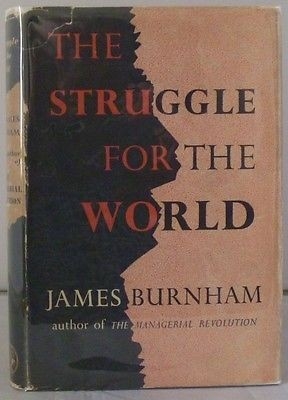 In March 1947, while getting ready to go to Jura and ride the Winston Smith book to the finish even if it killed him (which it did), Orwell wrote his long, penetrating review of The Struggle for the World. He paid some compliments, but also noted some subtle flaws in Burnham’s reasoning. Here he’s talking about Burnham’s willingness to contemplate a preventive war against the USSR:
In March 1947, while getting ready to go to Jura and ride the Winston Smith book to the finish even if it killed him (which it did), Orwell wrote his long, penetrating review of The Struggle for the World. He paid some compliments, but also noted some subtle flaws in Burnham’s reasoning. Here he’s talking about Burnham’s willingness to contemplate a preventive war against the USSR: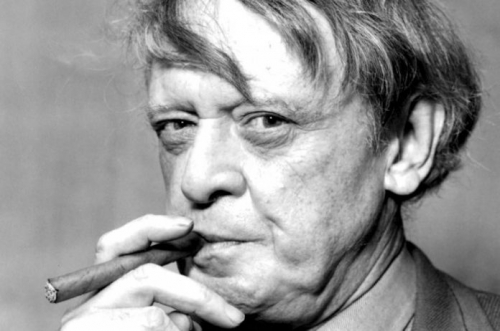
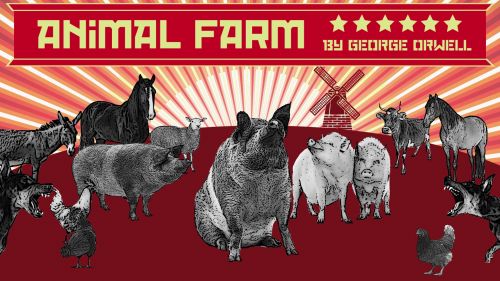
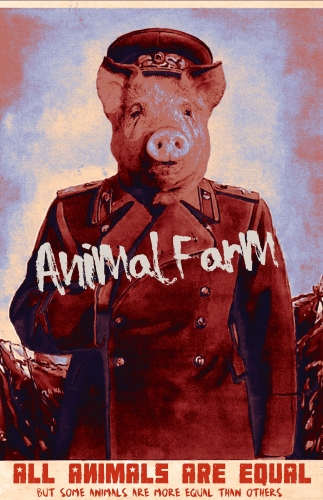 When Orwell finished Animal Farm in 1945, it was a very bad time to promote anti-Communist books with talking animals. This one was too clearly an allegory about the Bolshevik Revolution and the Stalinist aftermath, as subtle as a cow-pie (one barnyard feature that does not appear in the book). Over two dozen publishers rejected it promptly; Churchill’s coalition government had been touting a pro-Soviet line since 1941. Against this background, Animal Farm was about as welcome as a sympathetic book review of Mein Kampf (which Orwell did in fact once publish, during the Phony War period).
When Orwell finished Animal Farm in 1945, it was a very bad time to promote anti-Communist books with talking animals. This one was too clearly an allegory about the Bolshevik Revolution and the Stalinist aftermath, as subtle as a cow-pie (one barnyard feature that does not appear in the book). Over two dozen publishers rejected it promptly; Churchill’s coalition government had been touting a pro-Soviet line since 1941. Against this background, Animal Farm was about as welcome as a sympathetic book review of Mein Kampf (which Orwell did in fact once publish, during the Phony War period).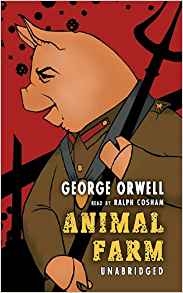 But the use of pigs raises all sorts of other complications. All the male pigs but Napoleon, we are told, have been castrated. This fact is introduced late in the book, and rather obliquely: “Napoleon was the only boar on the farm.” But hold on: Napoleon has sired many porkers, presumably male often as not. Surely they’re still intact – some of them, anyway. Is Orwell just being forgetful, or does he fear certain distasteful matters will slow down the story?
But the use of pigs raises all sorts of other complications. All the male pigs but Napoleon, we are told, have been castrated. This fact is introduced late in the book, and rather obliquely: “Napoleon was the only boar on the farm.” But hold on: Napoleon has sired many porkers, presumably male often as not. Surely they’re still intact – some of them, anyway. Is Orwell just being forgetful, or does he fear certain distasteful matters will slow down the story?
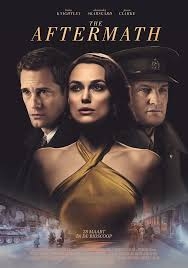 Cinematographer Franz Lustig’s opening scenes confront even the most unsuspecting and ill-informed audience with the sight of an almost obliterated Hamburg filled with crumbling buildings. Raw footage shows, or at least intimates, that a deliberate and premeditated plan had achieved its desired effect of sending Germany back to the Stone Age. This plan, codenamed Operation Gomorrah, which was at the time the heaviest aerial assault ever undertaken, was later called “Germany’s Hiroshima” by British Bomber Command. Reel after reel offers shocking images: black-and white photo montages of the chaff-filled skies and the abhorrent results of the merciless firebombing that had raised a four-hundred-and-sixty-meter scorching-hot tornado that reached temperatures of up to eight hundred degrees Celsius, and swept over twenty-one square kilometers of the city. Carried out by Lancaster, Wellington, Stirling, and Halifax aircraft, their blockbuster bombs turned asphalt streets into rivers of flame, asphyxiating young and old alike in a sea of carbon monoxide, and as one eyewitness later recalled, it “sucked people like dry leaves into its molten heart.”
Cinematographer Franz Lustig’s opening scenes confront even the most unsuspecting and ill-informed audience with the sight of an almost obliterated Hamburg filled with crumbling buildings. Raw footage shows, or at least intimates, that a deliberate and premeditated plan had achieved its desired effect of sending Germany back to the Stone Age. This plan, codenamed Operation Gomorrah, which was at the time the heaviest aerial assault ever undertaken, was later called “Germany’s Hiroshima” by British Bomber Command. Reel after reel offers shocking images: black-and white photo montages of the chaff-filled skies and the abhorrent results of the merciless firebombing that had raised a four-hundred-and-sixty-meter scorching-hot tornado that reached temperatures of up to eight hundred degrees Celsius, and swept over twenty-one square kilometers of the city. Carried out by Lancaster, Wellington, Stirling, and Halifax aircraft, their blockbuster bombs turned asphalt streets into rivers of flame, asphyxiating young and old alike in a sea of carbon monoxide, and as one eyewitness later recalled, it “sucked people like dry leaves into its molten heart.”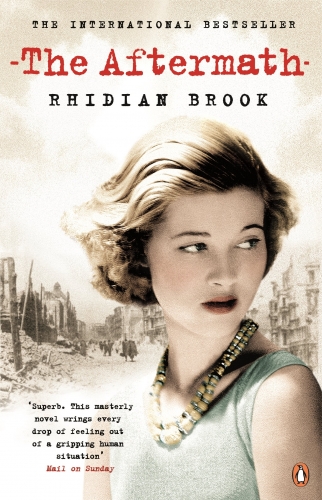 Stefan Lubert (Alexander Skarsgard), a widower, and his daughter Freda (Flora Thiemann), are the people whose palatial home Rachael has in effect invaded when it is requisitioned by the occupying forces to billet the Morgans. Rachael insists, “I want them out!”, which means in effect expelling them to the refugee camps. She also asks them difficult questions about a certain portrait that had only recently been removed from a place of honor over their fireplace and hurriedly replaced by another painting. These are petty acts of spiteful sadism that were no doubt common practice and openly endorsed by the non-fraternization code at that time, but in the context of the film’s narrative clearly signals more about Rachael’s own insecurities than it does about any misdemeanors or malicious intent on the part of those in whose home she resides.
Stefan Lubert (Alexander Skarsgard), a widower, and his daughter Freda (Flora Thiemann), are the people whose palatial home Rachael has in effect invaded when it is requisitioned by the occupying forces to billet the Morgans. Rachael insists, “I want them out!”, which means in effect expelling them to the refugee camps. She also asks them difficult questions about a certain portrait that had only recently been removed from a place of honor over their fireplace and hurriedly replaced by another painting. These are petty acts of spiteful sadism that were no doubt common practice and openly endorsed by the non-fraternization code at that time, but in the context of the film’s narrative clearly signals more about Rachael’s own insecurities than it does about any misdemeanors or malicious intent on the part of those in whose home she resides.
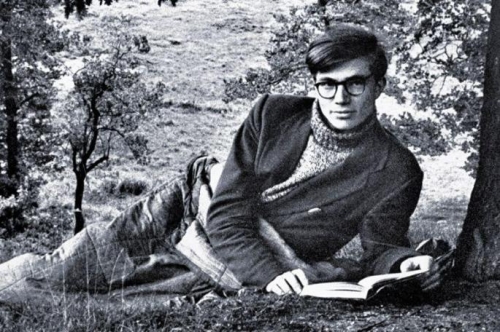
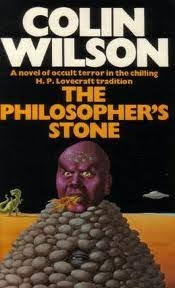 Mr. Wilson begins his “inquiry into the nature of the sickness of mankind in the twentieth century” at the effective point of the writers who have most influence in the present intellectual world. They are mostly good writers; they are not among the writers catering for those intellectuals who have every qualification except an intellect. They are good, some are very good: but at the end of it all what emerges? One of the best of these writers predicted that at the end of it all comes “the Russian man” described by Mr. Wilson as “a creature of nightmare who is no longer the homo sapiens, but an existentialist monster who rejects all thought”, As Hesse, the prophet of this coming, put it: “he is primeval matter, monstrous soul stuff. He cannot live in this form; he can only pass on”. The words “he can only pass on” seem the essence of the matter; this thinking is a chaos between two orders. At some point, if we are ever to regain sanity, we must regard again the first order before we can hope to win the second. It was a long way from Hellas to “the Russian man”; it may not be so far from the turmoil of these birth pangs to fresh creation. It is indeed well worth taking a look at the intellectual situation; where Europeans were, and where we are.
Mr. Wilson begins his “inquiry into the nature of the sickness of mankind in the twentieth century” at the effective point of the writers who have most influence in the present intellectual world. They are mostly good writers; they are not among the writers catering for those intellectuals who have every qualification except an intellect. They are good, some are very good: but at the end of it all what emerges? One of the best of these writers predicted that at the end of it all comes “the Russian man” described by Mr. Wilson as “a creature of nightmare who is no longer the homo sapiens, but an existentialist monster who rejects all thought”, As Hesse, the prophet of this coming, put it: “he is primeval matter, monstrous soul stuff. He cannot live in this form; he can only pass on”. The words “he can only pass on” seem the essence of the matter; this thinking is a chaos between two orders. At some point, if we are ever to regain sanity, we must regard again the first order before we can hope to win the second. It was a long way from Hellas to “the Russian man”; it may not be so far from the turmoil of these birth pangs to fresh creation. It is indeed well worth taking a look at the intellectual situation; where Europeans were, and where we are.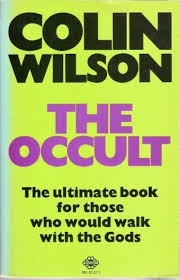 This union of mind and will, of intellect and emotion in the classic Greek, this essential harmony of man and nature, this at-oneness of the human with the eternal spirit evoke the contrast of the living and the dying when set against the prevailing tendencies of modern literature. For, as Mr. Wilson puts it very acutely: when “misery will never end” is combined with “nothing is worth doing”, “the result is a kind of spiritual syphillis that can hardly stop short of death or insanity”. Yet such writers are not all “pre-occupied with sex, crime and disease”, treating of heroes who live in one room because, apparently, they dare not enter the world outside, and derive their little satisfaction of the universe from looking through a hole in the wall at a woman undressing in the next room. They are not all concerned like Dostoievsky’s “beetle man” with life “under the floor boards” (a study which should put none of us off reading him as far as the philosophy of the Grand Inquisitor and a certain very interesting conversation with the devil in the Brothers Karamazof, which Mr. Wilson rightly places very high in the world’s literature). Many of these writers of pessimism, of destruction and death have a considerable sense of beauty. Hesse’s remarkable Steppenwolf found his “life had become weariness” and he “wandered in a maze of unhappiness that led to the renunciation of nothingness”; but then “for months together my heart stood still between delight and stark sorrow to find how rich was the gallery of my life, and how thronged was the soul of wretched Steppenwolf with high eternal stars and constellations . . . this life of mine was noble. It came of high descent, and turned, not on trifles, but on the stars.” Mr. Wilson well comments that “stripped of its overblown language,” “this experience can be called the ultimately valid core of romanticism — a type of religious affirmation”. And in such writing we can still see a reflection of the romantic movement of the northern gothic world which Goethe strove to unite with the sunlit classic movement in the great synthesis of his Helena. But it ends generally in this literature with a retreat from life, a monastic detachment or suicide rather than advance into such a wider life fulfilment. The essence is that these people feel themselves inadequate to life; they feel even that to live at all is instantly to destroy whatever flickering light of beauty they hold within them. For instance De Lisle Adam’s hero Axel had a lady friend who shot at him “with two pistols at a distance of five yards, but missed him both times.” Yet even after this dramatic and perfect illustration of the modern sex relationship, they could not face life : “we have destroyed in our strange hearts the love of life . . . to live would only be a sacrilege against ourselves . . .” “They drink the goblet of poison together and die in ecstasy.” All of which is a pity for promising people, but, in any case, is preferable to the “beetle man”, “under the floor boards”, wall-peepers, et hoc genus omne, of burrowing fugitives; “Samson you cannot be too quick”, is a natural first reaction to them. Yet Mr. Wilson teaches us well not to laugh too easily, or too lightly to dismiss them; it is a serious matter. This is serious if it is the death of a civilisation; it is still more serious if it is not death but the pangs of a new birth. And, in any case, even the worst of them possess in some way the essential sensitivity which the philistine lacks. So we will not laugh at even the extremes of this system, or rather way of thinking; something may come out of it all, because at least they feel. But Mr. Wilson in turn should not smile too easily at the last “period of intense and healthy optimism that did not mind hard work and pedestrian logic.” He seems to regard the nineteenth century as a “childish world” which presaged “endless changes in human life” so that “man would go forward indefinitely on ‘stepping stones of his dead self’ to higher things.” He thinks that before we “condemn it for short-sightedness”, ” we survivors of two world wars and the atomic bomb” (at this point surely he outdoes the Victorians in easy optimism, for it is far from over yet) “would do well to remember that we are in the position of adults condemning children”. Why? — is optimism necessarily childish and pessimism necessarily adult? Sometimes this paralysed pessimism seems more like the condition of a shell-shocked child. Health can be the state of an adult and disease the condition of a child. Of course, if serious Victorians really believed in “the establishment of Utopia before the end of the century”, they were childish; reformist thinking of that degree is always childish in comparison with organic thinking. But there are explanations of the difference between the nineteenth and the twentieth century attitude, other than this distinction between childhood and manhood. Spengler said somewhere that the nineteenth century stood in relation to the twentieth century as the Athens of Pericles stood in relation to the Rome of Caesar. In his thesis this is not a distinction between youth and age — a young society does not reach senescence in so short a period — but the difference between an epoch which is dedicated to thought and an epoch which has temporarily discarded thought in favour of action, in the almost rhythmic alternation between the two states which his method of history observes. It may be that in this most decisive of all great periods of action the intellectual is really not thinking at all; he is just despairing. When he wakes up from his bad dream he may find a world created by action in which he can live, and can even think. Mr. Wilson will not quarrel with the able summary of his researches printed on the cover of his book : “it is the will that matters.” And he would therefore scarcely dispute the view just expressed; perhaps the paradox of Mr. Wilson in this period is that he is thinking. That thought might lead him through and far beyond the healthy “cowboy rodeo” of the Victorian philosophers in their sweating sunshine, on (not back) to the glittering light and shade of the Hellenic world — das Land der Griechen mit der Seele suchen — and even beyond it to the radiance of the zweite Hellas. Mr. Wilson does not seem yet to be fully seized of Hellenism, and seems still less aware of the more conscious way of European thinking that passes beyond Hellas to a clearer account of world purpose. He has evidently read a good deal of Goethe with whom such modern thinking effectively begins, and he is the first of the new generation to feel that admiration for Shaw which was bound to develop when thought returned. But he does not seem to be aware of any slowly emerging system of European thinking which has journeyed from Heraclitus to Goethe and on to Shaw, Ibsen and other modems, until with the aid of modern science and the new interpretation of history it begins to attain consciousness.
This union of mind and will, of intellect and emotion in the classic Greek, this essential harmony of man and nature, this at-oneness of the human with the eternal spirit evoke the contrast of the living and the dying when set against the prevailing tendencies of modern literature. For, as Mr. Wilson puts it very acutely: when “misery will never end” is combined with “nothing is worth doing”, “the result is a kind of spiritual syphillis that can hardly stop short of death or insanity”. Yet such writers are not all “pre-occupied with sex, crime and disease”, treating of heroes who live in one room because, apparently, they dare not enter the world outside, and derive their little satisfaction of the universe from looking through a hole in the wall at a woman undressing in the next room. They are not all concerned like Dostoievsky’s “beetle man” with life “under the floor boards” (a study which should put none of us off reading him as far as the philosophy of the Grand Inquisitor and a certain very interesting conversation with the devil in the Brothers Karamazof, which Mr. Wilson rightly places very high in the world’s literature). Many of these writers of pessimism, of destruction and death have a considerable sense of beauty. Hesse’s remarkable Steppenwolf found his “life had become weariness” and he “wandered in a maze of unhappiness that led to the renunciation of nothingness”; but then “for months together my heart stood still between delight and stark sorrow to find how rich was the gallery of my life, and how thronged was the soul of wretched Steppenwolf with high eternal stars and constellations . . . this life of mine was noble. It came of high descent, and turned, not on trifles, but on the stars.” Mr. Wilson well comments that “stripped of its overblown language,” “this experience can be called the ultimately valid core of romanticism — a type of religious affirmation”. And in such writing we can still see a reflection of the romantic movement of the northern gothic world which Goethe strove to unite with the sunlit classic movement in the great synthesis of his Helena. But it ends generally in this literature with a retreat from life, a monastic detachment or suicide rather than advance into such a wider life fulfilment. The essence is that these people feel themselves inadequate to life; they feel even that to live at all is instantly to destroy whatever flickering light of beauty they hold within them. For instance De Lisle Adam’s hero Axel had a lady friend who shot at him “with two pistols at a distance of five yards, but missed him both times.” Yet even after this dramatic and perfect illustration of the modern sex relationship, they could not face life : “we have destroyed in our strange hearts the love of life . . . to live would only be a sacrilege against ourselves . . .” “They drink the goblet of poison together and die in ecstasy.” All of which is a pity for promising people, but, in any case, is preferable to the “beetle man”, “under the floor boards”, wall-peepers, et hoc genus omne, of burrowing fugitives; “Samson you cannot be too quick”, is a natural first reaction to them. Yet Mr. Wilson teaches us well not to laugh too easily, or too lightly to dismiss them; it is a serious matter. This is serious if it is the death of a civilisation; it is still more serious if it is not death but the pangs of a new birth. And, in any case, even the worst of them possess in some way the essential sensitivity which the philistine lacks. So we will not laugh at even the extremes of this system, or rather way of thinking; something may come out of it all, because at least they feel. But Mr. Wilson in turn should not smile too easily at the last “period of intense and healthy optimism that did not mind hard work and pedestrian logic.” He seems to regard the nineteenth century as a “childish world” which presaged “endless changes in human life” so that “man would go forward indefinitely on ‘stepping stones of his dead self’ to higher things.” He thinks that before we “condemn it for short-sightedness”, ” we survivors of two world wars and the atomic bomb” (at this point surely he outdoes the Victorians in easy optimism, for it is far from over yet) “would do well to remember that we are in the position of adults condemning children”. Why? — is optimism necessarily childish and pessimism necessarily adult? Sometimes this paralysed pessimism seems more like the condition of a shell-shocked child. Health can be the state of an adult and disease the condition of a child. Of course, if serious Victorians really believed in “the establishment of Utopia before the end of the century”, they were childish; reformist thinking of that degree is always childish in comparison with organic thinking. But there are explanations of the difference between the nineteenth and the twentieth century attitude, other than this distinction between childhood and manhood. Spengler said somewhere that the nineteenth century stood in relation to the twentieth century as the Athens of Pericles stood in relation to the Rome of Caesar. In his thesis this is not a distinction between youth and age — a young society does not reach senescence in so short a period — but the difference between an epoch which is dedicated to thought and an epoch which has temporarily discarded thought in favour of action, in the almost rhythmic alternation between the two states which his method of history observes. It may be that in this most decisive of all great periods of action the intellectual is really not thinking at all; he is just despairing. When he wakes up from his bad dream he may find a world created by action in which he can live, and can even think. Mr. Wilson will not quarrel with the able summary of his researches printed on the cover of his book : “it is the will that matters.” And he would therefore scarcely dispute the view just expressed; perhaps the paradox of Mr. Wilson in this period is that he is thinking. That thought might lead him through and far beyond the healthy “cowboy rodeo” of the Victorian philosophers in their sweating sunshine, on (not back) to the glittering light and shade of the Hellenic world — das Land der Griechen mit der Seele suchen — and even beyond it to the radiance of the zweite Hellas. Mr. Wilson does not seem yet to be fully seized of Hellenism, and seems still less aware of the more conscious way of European thinking that passes beyond Hellas to a clearer account of world purpose. He has evidently read a good deal of Goethe with whom such modern thinking effectively begins, and he is the first of the new generation to feel that admiration for Shaw which was bound to develop when thought returned. But he does not seem to be aware of any slowly emerging system of European thinking which has journeyed from Heraclitus to Goethe and on to Shaw, Ibsen and other modems, until with the aid of modern science and the new interpretation of history it begins to attain consciousness.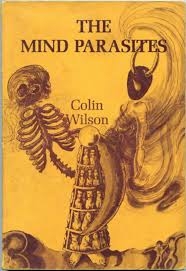 He is acute at one point in observing the contrasts between the life joy of the Greeks and the moments when their art is “full of the consciousness of death and its inevitability”. But he still apparently regards them as “healthy, once born, optimists,” not far removed from the modern bourgeois who also realises that life is precarious. He apparently thinks they did not share with the Outsider the knowledge that an “exceptional sense of life’s precariousness” can be “a hopeful means to increase his toughness”. The Greeks, of course, had not the advantage of reading Mr. Toynbee’s Study of History, which does not appear on a reasonably careful reading to be mentioned in Mr. Wilson’s book.
He is acute at one point in observing the contrasts between the life joy of the Greeks and the moments when their art is “full of the consciousness of death and its inevitability”. But he still apparently regards them as “healthy, once born, optimists,” not far removed from the modern bourgeois who also realises that life is precarious. He apparently thinks they did not share with the Outsider the knowledge that an “exceptional sense of life’s precariousness” can be “a hopeful means to increase his toughness”. The Greeks, of course, had not the advantage of reading Mr. Toynbee’s Study of History, which does not appear on a reasonably careful reading to be mentioned in Mr. Wilson’s book.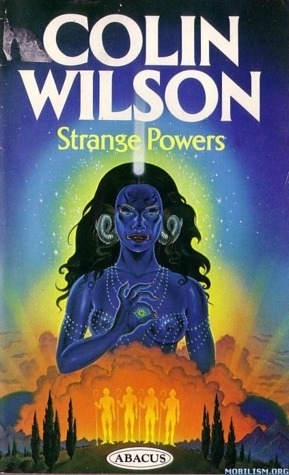 But Mr. Wilson moves far beyond Sartre in regarding the thinkers of an earlier period; notably Blake. At this point he recovers direction. The reader will find pages 225 to 250 among the most important of this book, but he must read the whole work for himself; this review is a commentary and an addendum, not a précis for the idle, nor a primer for those who find anything serious too difficult. The author advances a long way when he considers Blake’s “skeleton key” to a solution for those who “mistake their own stagnation for the world’s”. Here we reach realisation that the “crises of’living demand the active co-operation of intellect, emotions, body on equal terms”; contact is made here with Goethe’s Ganzheit, although it is not mentioned. “Energy is eternal delight” takes us a long way clear o the damp caverns of neo-existentialism and
But Mr. Wilson moves far beyond Sartre in regarding the thinkers of an earlier period; notably Blake. At this point he recovers direction. The reader will find pages 225 to 250 among the most important of this book, but he must read the whole work for himself; this review is a commentary and an addendum, not a précis for the idle, nor a primer for those who find anything serious too difficult. The author advances a long way when he considers Blake’s “skeleton key” to a solution for those who “mistake their own stagnation for the world’s”. Here we reach realisation that the “crises of’living demand the active co-operation of intellect, emotions, body on equal terms”; contact is made here with Goethe’s Ganzheit, although it is not mentioned. “Energy is eternal delight” takes us a long way clear o the damp caverns of neo-existentialism and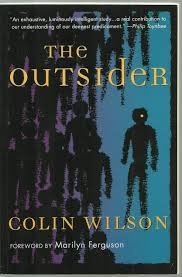 No men ever had a deeper sense of the human tragedy than the Greeks; none ever faced it with such brilliant bravery or understood so well not only the art of grasping the fleeting, ecstatic moment, but of turning even despair to the enhancement of beauty. Living was yet great; they understood dennoch preisen; they did not “leave living to their servants”. Mr. Wilson in quoting Aristotle in the same sense as the above lines of Sophocles — “not to be born is the best thing, and death is better than life” — holds that “this view” lies at one extreme of religion, and that “the other extreme is vitalism”. He does not seem at this point fully to understand that the extremes in the Hellenic nature can be not contradictory but complementary, or interacting. The polarity of Greek thought was closely observed and finely interpreted by Nietzsche in diverse ways. But it was left to Goethe to express the more conscious thought beyond polarity in his Faust: the Prologue in Heaven:
No men ever had a deeper sense of the human tragedy than the Greeks; none ever faced it with such brilliant bravery or understood so well not only the art of grasping the fleeting, ecstatic moment, but of turning even despair to the enhancement of beauty. Living was yet great; they understood dennoch preisen; they did not “leave living to their servants”. Mr. Wilson in quoting Aristotle in the same sense as the above lines of Sophocles — “not to be born is the best thing, and death is better than life” — holds that “this view” lies at one extreme of religion, and that “the other extreme is vitalism”. He does not seem at this point fully to understand that the extremes in the Hellenic nature can be not contradictory but complementary, or interacting. The polarity of Greek thought was closely observed and finely interpreted by Nietzsche in diverse ways. But it was left to Goethe to express the more conscious thought beyond polarity in his Faust: the Prologue in Heaven: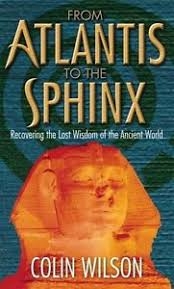 May we end with a few questions based on that doctrine of higher forms which has found some expression in this Journal and in previous writings? Is it not now possible to observe with reason and as something approaching a clearly defined whole, what has hitherto only been revealed in fitful glimpses to the visionary? What are the means of observation available to those who are not blessed with the revelation of vision? Are they not the thoughts of great minds which have observed the working of the divine in nature and the researches of modern science which appear largely to confirm them?
May we end with a few questions based on that doctrine of higher forms which has found some expression in this Journal and in previous writings? Is it not now possible to observe with reason and as something approaching a clearly defined whole, what has hitherto only been revealed in fitful glimpses to the visionary? What are the means of observation available to those who are not blessed with the revelation of vision? Are they not the thoughts of great minds which have observed the working of the divine in nature and the researches of modern science which appear largely to confirm them?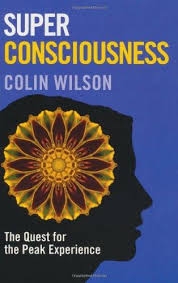 At some point the spirit, the soul — call it what you will — is ignited by some spark of the divine and moves without necessity; yet, again it is a matter of common observation that this only occurs in very advanced types. In general it is only the “challenge” of adverse circumstance which evokes the “response” of movement to a higher state. Goethe expressed this thought very clearly in Faust by his concept of evil’s relationship to good; he also indicated the type where the conscious striving of the aspiring spirit replaces the urge of suffering in the final attainment of salvation: wer immer strebend sich bemüht, den können wir erlösen. In the early stages of the great striving all suffering, and later all beauty must be experienced and sensed; but to no moment of ecstasy can man say, verweile doch, du bist so schön until the final passing to an infinity of beauty at present beyond man’s ken. Complacency, at any point, is certainly excluded. So must it be always in a creed which begins effectively with Heraclitus and now pervades modern vitalism. The philosophy of the “ever living fire”, of the ewig werdende could never be associated with complacency. Still less can the more conscious doctrine of higher forms co-exist with the static, or with the illusory perfections of a facile reformism. Man began very small, and has become not so small; he must end very great, or cease to be. That is the essence of the matter. Is it true? This is a question which everyone must answer for himself after studying European literature which stretches from the Greeks to the vital thought of modern times and, also, the world thinking of many different climes and ages which in many ways and at most diverse points is strangely related. He should study, too, either directly or through the agency of those most competent to judge, the evolutionary processes revealed so relatively recently by modern biology and the apparently ever increasing concept of ordered complexity in modern physics. He must then answer two questions: the first is whether it is more likely than not that a purpose exists in life? — the second is whether despite all failures and obscurities the only discernable purpose is a movement from lower to higher forms? If he comes at length to a conclusion which answers both these questions with a considered affirmative, he has reached the point of the great affirmation. The new religious impulse which so many seek is really already here. We need neither prophets nor priests to find it for ourselves, although we are not the enemies but the friends of those who do. For ourselves we can find in the thought of the world the faith and the service of the conscious and sentient man.
At some point the spirit, the soul — call it what you will — is ignited by some spark of the divine and moves without necessity; yet, again it is a matter of common observation that this only occurs in very advanced types. In general it is only the “challenge” of adverse circumstance which evokes the “response” of movement to a higher state. Goethe expressed this thought very clearly in Faust by his concept of evil’s relationship to good; he also indicated the type where the conscious striving of the aspiring spirit replaces the urge of suffering in the final attainment of salvation: wer immer strebend sich bemüht, den können wir erlösen. In the early stages of the great striving all suffering, and later all beauty must be experienced and sensed; but to no moment of ecstasy can man say, verweile doch, du bist so schön until the final passing to an infinity of beauty at present beyond man’s ken. Complacency, at any point, is certainly excluded. So must it be always in a creed which begins effectively with Heraclitus and now pervades modern vitalism. The philosophy of the “ever living fire”, of the ewig werdende could never be associated with complacency. Still less can the more conscious doctrine of higher forms co-exist with the static, or with the illusory perfections of a facile reformism. Man began very small, and has become not so small; he must end very great, or cease to be. That is the essence of the matter. Is it true? This is a question which everyone must answer for himself after studying European literature which stretches from the Greeks to the vital thought of modern times and, also, the world thinking of many different climes and ages which in many ways and at most diverse points is strangely related. He should study, too, either directly or through the agency of those most competent to judge, the evolutionary processes revealed so relatively recently by modern biology and the apparently ever increasing concept of ordered complexity in modern physics. He must then answer two questions: the first is whether it is more likely than not that a purpose exists in life? — the second is whether despite all failures and obscurities the only discernable purpose is a movement from lower to higher forms? If he comes at length to a conclusion which answers both these questions with a considered affirmative, he has reached the point of the great affirmation. The new religious impulse which so many seek is really already here. We need neither prophets nor priests to find it for ourselves, although we are not the enemies but the friends of those who do. For ourselves we can find in the thought of the world the faith and the service of the conscious and sentient man.
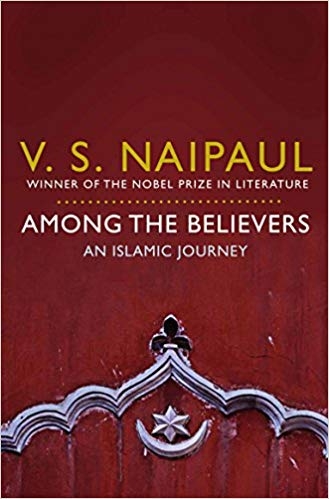 Naipaul had a unique background. He was of Hindu Indian origins and grew up in the British Empire’s West Indian colony of Trinidad and Tobago. Naipaul wrote darkly of his region of birth, stating, “History is built around achievement and creation; and nothing was created in the West Indies.”
Naipaul had a unique background. He was of Hindu Indian origins and grew up in the British Empire’s West Indian colony of Trinidad and Tobago. Naipaul wrote darkly of his region of birth, stating, “History is built around achievement and creation; and nothing was created in the West Indies.”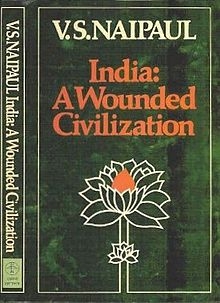 The arrival of Islam to the Sind is the disaster which keeps on giving.
The arrival of Islam to the Sind is the disaster which keeps on giving. 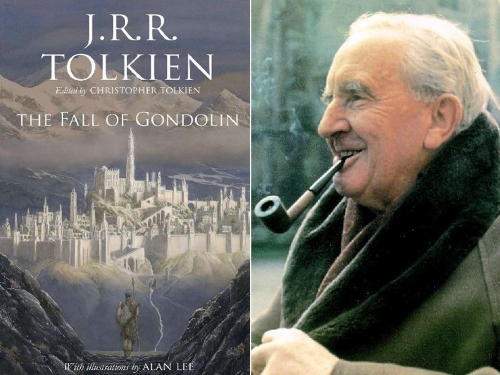
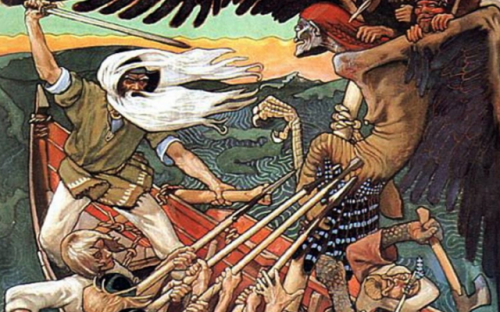
 The Kalevala was first published in 1835, but the tales therein date back to antiquity and were handed down orally. The poems were originally songs, all sung in trochaic tetrameter (now known as the “Kalevala meter”). This oral tradition began to decline after the Reformation and the suppression of paganism by the Lutheran Church. It is largely due to the efforts of collectors like Lönnrot that Finnish folklore has survived.
The Kalevala was first published in 1835, but the tales therein date back to antiquity and were handed down orally. The poems were originally songs, all sung in trochaic tetrameter (now known as the “Kalevala meter”). This oral tradition began to decline after the Reformation and the suppression of paganism by the Lutheran Church. It is largely due to the efforts of collectors like Lönnrot that Finnish folklore has survived.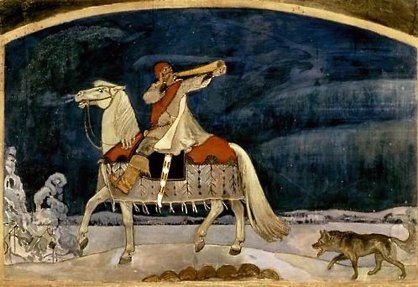
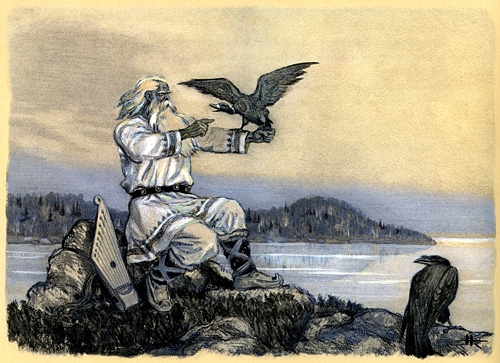
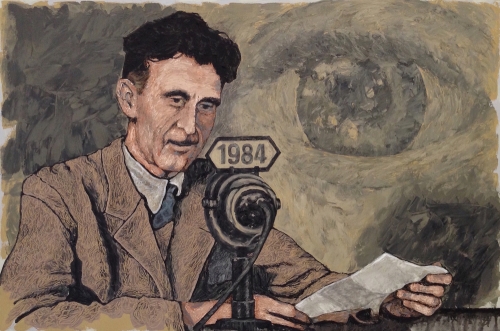

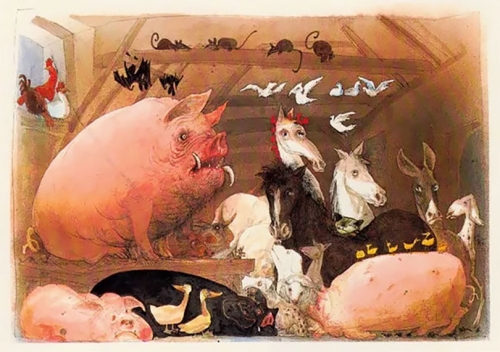
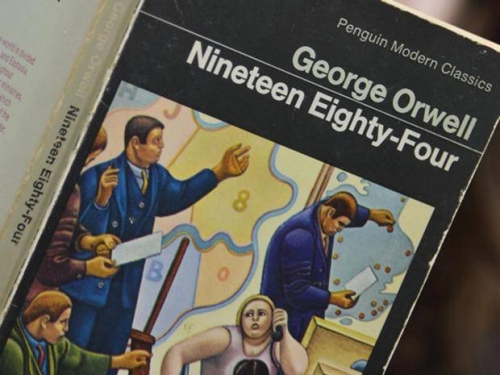
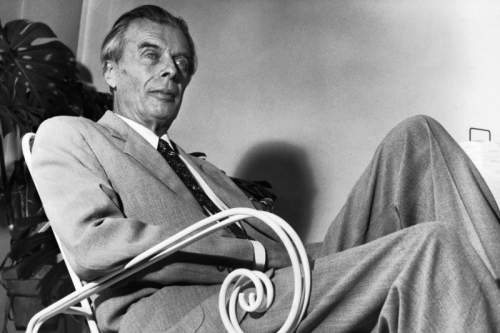
 Le communisme a facilement chuté partout finalement mais il a été remplacé parce que Debord nomme le spectaculaire intégré. Tocqueville déjà disait « qu’en démocratie on laisse le corps pour s’attaquer à l’âme. »
Le communisme a facilement chuté partout finalement mais il a été remplacé parce que Debord nomme le spectaculaire intégré. Tocqueville déjà disait « qu’en démocratie on laisse le corps pour s’attaquer à l’âme. » La surpopulation américaine menacera la démocratie américaine (triplement en un siècle ! La France a crû de 40% en cinquante ans) :
La surpopulation américaine menacera la démocratie américaine (triplement en un siècle ! La France a crû de 40% en cinquante ans) : Dix ans avant Umberto Eco (voyez mon livre sur Internet), Huxley annonce un nouveau moyen âge, pas celui de Guénon bien sûr, celui de Le Goff plutôt :
Dix ans avant Umberto Eco (voyez mon livre sur Internet), Huxley annonce un nouveau moyen âge, pas celui de Guénon bien sûr, celui de Le Goff plutôt : Huxley n’est pas très optimise non plus sur l’avenir des enfants mués en de la chair à télé :
Huxley n’est pas très optimise non plus sur l’avenir des enfants mués en de la chair à télé : Quant au futur, no comment :
Quant au futur, no comment : Dans son maigre énoncé des solutions (il n’en a pas), Huxley évoque alors la prison sans barreau (the painless concentration camp, expression mise en doute par certains pro-systèmes !) :
Dans son maigre énoncé des solutions (il n’en a pas), Huxley évoque alors la prison sans barreau (the painless concentration camp, expression mise en doute par certains pro-systèmes !) :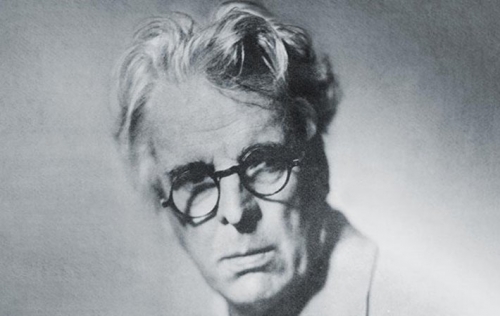
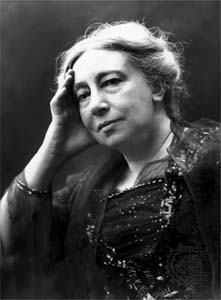 Despite cultural nativism being at its centre, Yeats’s Protestant background was shared by most of the leading figures of the movement. Among these were the Galway based aristocrat and folklorist Lady Gregory, whose Coole Park home formed the nerve centre of the movement, and the Rathfarnham born poet and playwright J.M. Synge, who later found solace in Irish peasant culture on the western seaboard as being a vestige of authentic Irish life amid a society of anglicisation. The poet’s identification with both the people and the very landscape of Ireland over the materialist England arose from his early childhood and formative experiences in Sligo, a period that would define him both as an artist as well as a man.
Despite cultural nativism being at its centre, Yeats’s Protestant background was shared by most of the leading figures of the movement. Among these were the Galway based aristocrat and folklorist Lady Gregory, whose Coole Park home formed the nerve centre of the movement, and the Rathfarnham born poet and playwright J.M. Synge, who later found solace in Irish peasant culture on the western seaboard as being a vestige of authentic Irish life amid a society of anglicisation. The poet’s identification with both the people and the very landscape of Ireland over the materialist England arose from his early childhood and formative experiences in Sligo, a period that would define him both as an artist as well as a man.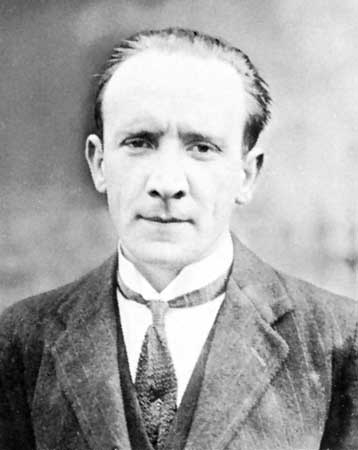 Despite some apprehension about the nature of the Easter Rising, as well as a latent sense of guilt that his work had inspired a good deal of the violence, Yeats took a dignified place within the Irish Seanad. He immediately began to orientate the Free State towards his ideals with efforts made to craft a unique form of symbolism for the new State in the form of currency, the short lived Tailteann Games and provisions made to the arts. Despite his
Despite some apprehension about the nature of the Easter Rising, as well as a latent sense of guilt that his work had inspired a good deal of the violence, Yeats took a dignified place within the Irish Seanad. He immediately began to orientate the Free State towards his ideals with efforts made to craft a unique form of symbolism for the new State in the form of currency, the short lived Tailteann Games and provisions made to the arts. Despite his 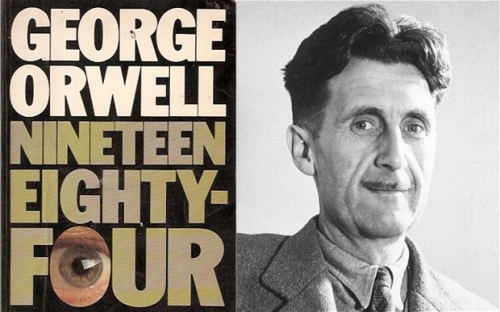
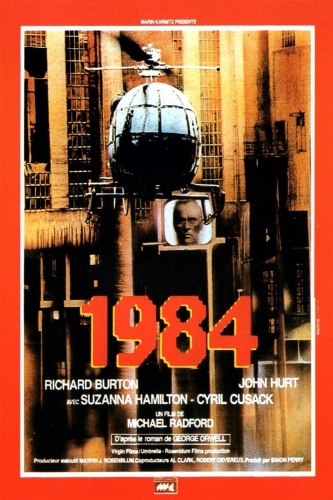 En manipulant les archives, l’on manipule les consciences. Il suffit pour cela de « rectifier » le passé en l’alignant sur les nécessités politiques de l’heure. Si d’aventure il arrive que la mémoire individuelle contredise la mémoire collective ainsi façonnée, la contradiction doit être résolue au profit de la seconde par l’élimination de la première. D’où l’utilité de la « double pensée » pour assurer le triomphe de l’orthodoxie. Il n’y a plus ni réalité ni objectivité. Selon les termes même d’O’Brien, « la réalité n’est pas extérieure. La réalité existe dans l’esprit humain et nulle part ailleurs... Tout ce que le parti tient pour la vérité est la vérité ». Par cette perversion totale de l’histoire et de la conscience historique, on atteint le point extrême de la logique totalitaire.
En manipulant les archives, l’on manipule les consciences. Il suffit pour cela de « rectifier » le passé en l’alignant sur les nécessités politiques de l’heure. Si d’aventure il arrive que la mémoire individuelle contredise la mémoire collective ainsi façonnée, la contradiction doit être résolue au profit de la seconde par l’élimination de la première. D’où l’utilité de la « double pensée » pour assurer le triomphe de l’orthodoxie. Il n’y a plus ni réalité ni objectivité. Selon les termes même d’O’Brien, « la réalité n’est pas extérieure. La réalité existe dans l’esprit humain et nulle part ailleurs... Tout ce que le parti tient pour la vérité est la vérité ». Par cette perversion totale de l’histoire et de la conscience historique, on atteint le point extrême de la logique totalitaire. 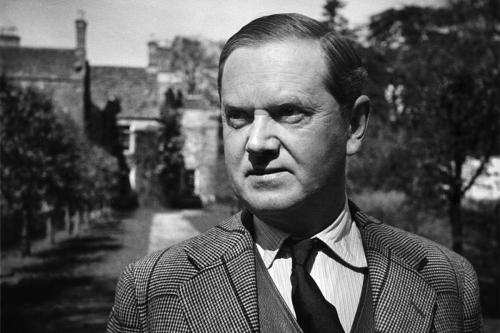
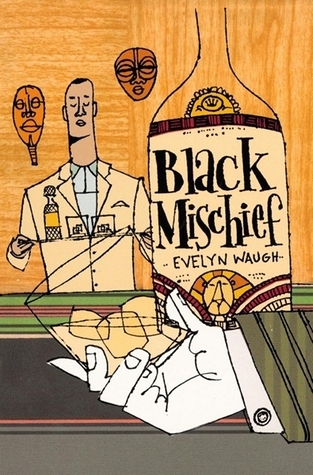 News of Seth’s victory reaches London where Basil Seal, the ne’er-do-well son of the Conservative Whip and a classmate of Seth’s at Oxford, is recovering from a series of scandalous benders that have forced him to abandon his nascent political career. Desperately in need of money, Seal travels to Azania as a free-lance journalist. Within a short time of his arrival, Basil becomes Seth’s most trusted adviser and is put in charge of the Ministry of Modernization; in effect, Basil has become the real ruler of Azania since Seth spends his time immersed in catalogs and dreaming up more and more ridiculous “progressive” schemes for the betterment of Azanians, such as requiring all citizens to learn Esperanto. The natives who run the other departments are all too happy to refer all business to Basil.
News of Seth’s victory reaches London where Basil Seal, the ne’er-do-well son of the Conservative Whip and a classmate of Seth’s at Oxford, is recovering from a series of scandalous benders that have forced him to abandon his nascent political career. Desperately in need of money, Seal travels to Azania as a free-lance journalist. Within a short time of his arrival, Basil becomes Seth’s most trusted adviser and is put in charge of the Ministry of Modernization; in effect, Basil has become the real ruler of Azania since Seth spends his time immersed in catalogs and dreaming up more and more ridiculous “progressive” schemes for the betterment of Azanians, such as requiring all citizens to learn Esperanto. The natives who run the other departments are all too happy to refer all business to Basil.